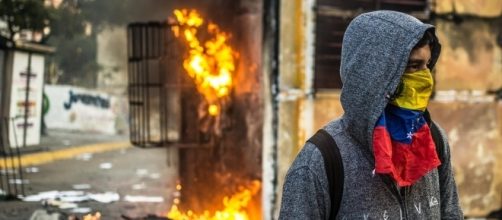This weekend was full of agitation and disturbances in Venezuela, which ended up showing the True Colors and ugly face of the dictatorship imposed by Nicolas Maduro. The scenes of a brutal crackdown on protesters opposed to the Constituent Assembly election, turning Sunday's vote into the bloodiest election in Venezuelan history, left its marks through the city and could still be spotted today.
Another point that has not made Maduro’s office very happy is the refuge of Elenis del Valle Rodríguez, one of the judges appointed by the opposition National Assembly to occupy a seat in the Supreme Court of Justice.
She has asked refuge at the residence of the Chilean ambassador in Caracas and her status has been confirmed by Chilean Foreign Minister Heraldo Muñoz.
Violence and elections
Shots, aggressions, and deaths of opponents, as well as exiles, were striking features of the dictatorships that sullied the history of Latin America in the 1970s and 1980s, but which seemed like something of the past.
The concern for Venezuelan authorities is that the citizens of the South American country did not accept the government-imposed frown and, according to the opposition, refused to vote. The opposition, therefore, calculated through the BDU (Bureau of Democratic Unity) that only 12% of the Venezuelan electorate had come to vote.
Tensions in the government were raised when the estimate was released and the authorities’ silence was only broken shortly after midnight, local time. The government then announced that eight million voters had appeared to vote, which means almost 40% of the country.
The two signals that negotiations might still be an option
The percentage of voters present on voting centers is something we might never know. Therefore, eventual number warfare aside, there is still hope for some sort of negotiation relating the Constituent Assembly and the Venezuelan relations with fellow South American nations.
The first signal shown by Venezuela was during the negotiations between Mercosur governments to establish a joint position on the vote.
The Uruguayan government was against an immediate install of the Constituent Assembly and defended that it there should be more time to negotiations.
Brazilian Foreign Minister Aloysio Nunes Ferreira has pronounced that the Venezuelan government accepted the proposal. However, Argentina rushed and issued an isolated note stating that it does not recognize the Constituent Assembly, a path anticipated by Panama, Peru, Colombia, the United States, Mexico, Costa Rica and Chile as well.
Even the nations that were Maduro's friends on the left have abandoned his efforts to crush Venezuela's democracy. https://t.co/j8yBX5uhmN pic.twitter.com/jVD169weZU
— Kenneth Roth (@KenRoth) August 1, 2017
The second signal came in response to the proposal made by Mercosur ten days ago regarding a meeting in Brasilia to assess the situation.
The Venezuelan government reacted in an unusual manner and instead of the usual disregard directed at the Mercosur rulers, Maduro praised the proposal to “follow the process of dialogue among Venezuelans”. He further suggested a meeting, not in Brasilia, but in Caracas in the first week of August.


